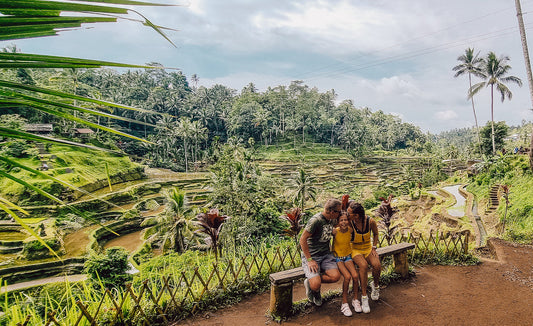Many travelers focus heavily on choosing the right destination when planning an international trip, but preparation often plays a far greater role in shaping the quality of the experience. The most beautiful place can quickly lose its charm if one arrives unprepared for cultural, logistical, or financial challenges.
A thoughtful approach to preparation can turn any trip, whether to a bustling city or a quiet coastal town, into a journey that feels smooth, rewarding, and enriching. Careful planning provides confidence, adaptability, and a sense of readiness that no itinerary or guidebook alone can offer.
Image source: https://www.pexels.com/photo/a-woman-using-a-laptop-with-headphones-7365302/
Understanding The Role of Research in Travel Success
Before setting foot in another country, research is the traveler’s strongest ally. Understanding local customs, transportation systems, safety tips, and regional etiquette avoids confusion and shows respect for the host culture. Travelers who invest time in learning about the language and traditions of their destination often enjoy smoother interactions and deeper cultural exchanges.
Whether reading local blogs, checking embassy advisories, or connecting with residents online, gathering knowledge ahead of time builds awareness that transforms a standard trip into a meaningful one. Taking the time to prepare thoroughly can make all the difference in creating a stress-free and enjoyable journey.
Packing Smart for Flexibility and Comfort
Packing efficiently can transform a trip, making travel smoother and more enjoyable. By carefully selecting important items and packing light for a week, travelers can move between destinations without the burden of heavy luggage or unnecessary items. Choosing versatile clothing that can be layered or dressed up ensures readiness for different weather conditions and social situations.
Organizing items with packing cubes, keeping important documents accessible, and including crucial toiletries adds convenience and reduces stress. Smart packing creates flexibility and comfort, allowing travelers to focus on exploring, experiencing, and enjoying the journey rather than worrying about their belongings.
Financial Planning and Budgeting for Peace of Mind
Money management is one of the most overlooked aspects of travel preparation. Unexpected expenses, ranging from baggage fees to currency fluctuations, can quickly derail a trip. A smart traveler calculates daily budgets for meals, transport, and attractions while leaving room for emergencies and spontaneous experiences.
Having multiple payment options, such as local currency and travel cards, helps avoid stressful situations abroad. Researching exchange rates and understanding tipping customs can prevent awkward moments and ensure financial security throughout the journey. Proper financial planning allows travelers to focus on enjoying their trip without constant worry about money.
Health and Safety Precautions Before Departure
Preparation includes attention to health and safety, which can determine the entire outcome of a trip. Visiting a doctor for vaccinations, gathering necessary prescriptions, and researching healthcare facilities in the destination country are practical steps that many travelers skip.
Travel insurance is another vital layer of protection, offering support in case of medical emergencies, flight cancellations, or lost belongings. Being proactive with these measures minimizes risks and builds peace of mind, allowing the traveler to focus on enjoying the experience rather than worrying about potential issues.
Adapting to Cultural Differences with Respect and Awareness
Preparation extends beyond logistics; it shapes how travelers interact with others. Cultural awareness, built through pre-trip research, can prevent misunderstandings and foster mutual respect. Learning about gestures, dress codes, and dining customs demonstrates sensitivity to local norms.
Even simple efforts, such as greeting someone in their native language, can lead to friendlier encounters. Travelers who prepare mentally for cultural differences often find themselves more open-minded and adaptable, experiencing a richer and more genuine connection with their destination.
Navigating Language Barriers Through Preparation
Language barriers can either create frustration or become an opportunity for connection, depending on how well a traveler has prepared. Learning basic phrases or downloading offline translation apps can make a significant difference in communication.
Carrying a small notebook or using gesture-based communication tools helps in situations where technology fails. Preparation in this area fosters confidence and independence, allowing travelers to navigate restaurants, transport systems, and local markets with ease rather than hesitation.
Planning for Technology and Connectivity Abroad
Today, when digital tools guide nearly every aspect of travel, preparation for connectivity abroad is crucial. Checking international data plans, purchasing local SIM cards, or setting up offline maps can prevent disorientation in unfamiliar places. Secure cloud backups for documents like passports and flight itineraries protect against loss or theft.
Having power adapters suited to local outlets avoids inconvenience when charging devices. Those who prepare their digital setup before departure can rely on technology as a helpful companion rather than a source of frustration.
Mental Preparation and Managing Expectations
Traveling abroad challenges the body and the mind, making mental preparation important for a smooth experience. Setting realistic expectations about schedules, weather, cultural differences, or unforeseen delays helps travelers stay calm when plans shift unexpectedly. Visualizing potential challenges, such as missed connections or language barriers, allows for proactive problem-solving and not frustration.
Embracing flexibility encourages curiosity and adaptability, turning surprises into opportunities for growth. Journaling, mindfulness practices, or simply reflecting on travel goals can strengthen emotional readiness. Travelers who prepare mentally are more likely to enjoy spontaneous experiences, appreciate small moments, and respond calmly to obstacles.
Sustainable and Responsible Travel Preparation
Thoughtful preparation can extend to sustainability and responsible tourism. Researching eco-friendly accommodations, supporting local businesses, and reducing waste through reusable items all contribute to a positive global impact. Understanding local environmental issues helps travelers act respectfully toward natural surroundings and communities.
A prepared traveler leaves behind more than memories. They contribute to preserving the beauty and culture of the places they visit. The mindset of preparation connects personal enjoyment with ethical responsibility, proving that good planning benefits the traveler and the destination.
The destination may draw the traveler, but preparation shapes the journey. Every stage of readiness, from budgeting and packing to cultural awareness and mental resilience, creates a foundation for meaningful travel experiences.
Trips abroad rarely unfold exactly as planned, but preparation provides the tools to adapt, connect, and thrive in unfamiliar settings. When travelers prepare thoughtfully, even the simplest destination becomes extraordinary, not because of what it offers, but because of how ready they are to embrace it.




